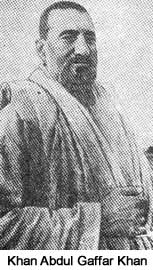

 |  |
 Jinnah decided in 1937-38 to opt for his last option. And once he took his decision he went all the way towards extreme communalism putting all the force and brilliance of his personality behind the new politics based on themes of hate and fear. From now on, the entire political campaign among Muslims of this tallest of communal leaders would be geared to appeal to his co-religionists' fear and insecurity and to drive home the theme that the Congress wanted not independence from British imperialism but a Hindu raj in cooperation with the British and domination over Muslims d even their extermination as also the destruction of Islam in India.
Jinnah decided in 1937-38 to opt for his last option. And once he took his decision he went all the way towards extreme communalism putting all the force and brilliance of his personality behind the new politics based on themes of hate and fear. From now on, the entire political campaign among Muslims of this tallest of communal leaders would be geared to appeal to his co-religionists' fear and insecurity and to drive home the theme that the Congress wanted not independence from British imperialism but a Hindu raj in cooperation with the British and domination over Muslims d even their extermination as also the destruction of Islam in India. In 1946, on 18 August, Jinnah referred to 'the caste Hindu Fascist Congress', which wanted to 'dominate and rule over Mussalmans and other minor communities of India with the aid of British bayonets'. In 1946, asking Muslims to vote for the League he said: 'If we fail to realize our duty today you will be reduced to the status of Sudras and Islam will be vanquished from India.' If a leader of the stature of Jinnah could take up politics and agitation at this low level, it was inevitable that the average communal propagandist would be often even worse. Men like Z.A. Suleri and F.M. Durrani surpassed themselves in Goebbelsian demagogy. Even Fazl-ul-Huq, holding a responsible position as the Premier of Bengal, told the 1938 session of the League: 'In Congress provinces, riots had laid the countryside waste. Muslim life, limb and property have been lost and blood had freely flowed. There the Muslims are leading their lives in constant terror, overawed and oppressed by Hindus . . . There mosques are being defiled and the culprit never found nor is the Muslim worshipper unmolested.' M.H. Gazdar, a prominent League leader of Sind, told a League meeting in Karachi in March 1941: 'The Hindus will have t be eradicated like the Jews in Germany if they did not behave properly.' The Muslim communalists now launched a vicious campaign against nationalist Muslims. Maulana Abul Kalam Azad and other nationalist : Muslims were branded as 'show boys' of the Congress, traitors to Islam, and mercenary agents of the Hindus. They were submitted, during 1945-47, to social terror through appeals to religious fanaticism and even to physical attacks. Jinnah himself in his presidential address to the League ; in April 1943 described Khan Abdul Ghaffar Khan as being 'in-charge of the Hinduizing influences and emasculation of the martial Pathans.' Religion was also now brought into the forefront of propaganda. In 1946, Muslims were asked to vote for the League because 'a vote for the League and Pakistan was a vote for Islam.' League meetings were often held in the mosques after Friday prayers. Pakistan, it was promised, would be ruled under the Sharia. Muslims were asked to choose between a 'mosque and a temple.' The Quran was widely used as the League's symbol; and the League's fight with the Congress was portrayed as a fight between Islam and Kufr (infidelity). next page >> |
Copyright ©2000 indiansaga.info. All rights reserved.
By using this service, you accept that you won't copy or use the data given in this website for any commercial purpose.
The material on indiansaga.info is for informational & educational purpose only.
This site is best viewed at 800 X 600 picture resolution.